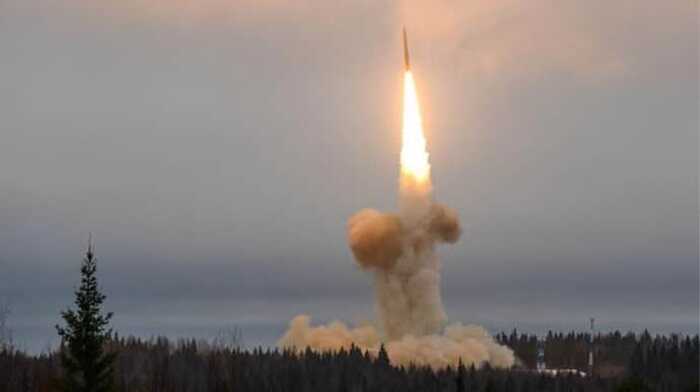
Use of weapon, which can carry nuclear payload, would mark its first use in any armed conflict if confirmed
Ukraine’s air force has said Russia fired an intercontinental ballistic missile (ICBM) at the city of Dnipro, which if confirmed would be the first time the long-range weapon has been used in any armed conflict.
The claim was not immediately accepted by others, however. ABC News reported, citing western officials, that this was an exaggeration and that the weapon was in fact a shorter-range ballistic missile, similar to the types used repeatedly by Russia against Ukraine during the war.
Nine projectiles were launched at enterprises and critical infrastructure in Dnipro between 5am and 7am local time from the Astrakhan region of Russia, the air forces said, meaning that, if confirmed, the missile probably travelled about 500 miles (800km) to reach its target.
The missile was said to have hit “without consequences” the air force said, though it added that information about victims had yet to be received. Six of the nine projectiles were destroyed by air defences, the air force said in a morning update.
John Healey, the UK defence secretary, told MPs he was aware of media reports that Russia had used “a new ballistic missile into Ukraine” and he described them as unconfirmed.
Video said to be of the incident from a distance showed the ground being struck in multiple flashes.
Russian ICBMs can have ranges of more than 6,200 miles, in theory enough to reach the US east coast from Astrakhan, and are capable of being nuclear armed, suggesting that if the use of the weapon is confirmed, it was a signal from Moscow.
Russia has not officially acknowledged the use of an ICBM, and its defence ministry omitted any reference to it in its daily briefing.
The Russian foreign ministry spokesperson, Maria Zakharova, appeared to inadvertently reveal some details about the early morning strike during a live press briefing on Thursday.
A hot mic captured Zakharova’s phone conversation with an unidentified caller who instructed her not to comment “on the ballistic missile strike”. Notably, the caller did not use the word intercontinental.
In the brief telephone exchange – footage of which remains available on the foreign ministry’s official account on X – the caller appears to disclose that the strike targeted the Yuzhmash military facility in Dnipro.
An agreement between the US and Russia signed in 2000 provides in theory that each side should notify the other at least 24 hours ahead of any planned missile launch in excess of 500km. It is unclear if any such notification was made.
Pavel Podvig, an expert on Russian nuclear weapons, said there was not yet enough information to determine whether the weapon used was an ICBM or not. “One must be sceptical and cautious,” he said in a post on Bluesky.
Using an ICBM would not make military sense because of their low accuracy and high cost, he added, though he wrote: “This kind of a strike might have a value as a signal”.
ICBMs were developed in the 1950s, at the height of the cold war, as a way for the Soviet Union and the US to threaten each other’s populations directly with nuclear weapons. US congressional research estimates that Russia has 326 ICBMs in its nuclear arsenal, but no country had fired one in a war before.
This week the US and the UK gave permission for Atacms and Storm Shadow missiles to be used against targets in or near the Kursk region of Russia. The Russian foreign minister, Sergei Lavrov, said this week that Moscow would respond “accordingly” in response to the initial permission to use Atacms.
On Wednesday the US suddenly announced that its embassy in Kyiv would be closed after receiving warning of a “potential significant air attack” somewhere in Ukraine. It is not clear what prompted the warning and the embassy was due to reopen, but the US closely monitors Russian ICBM activity given the homeland threat.
Ukraine did not identify the type of ICBM it believed had been fired, and there was no immediate corroborating detail, though the trajectory of the missile would be apparent to Ukraine’s air defences and its western allies.
Initial reports from Dnipro gave only a limited picture of any impact on civilians. Serhiy Lysak, the head of the civil military administration, reported that an industrial enterprise had been damaged and that there were two fires in the city.
Read more similar news:
Comments:
comments powered by Disqus































